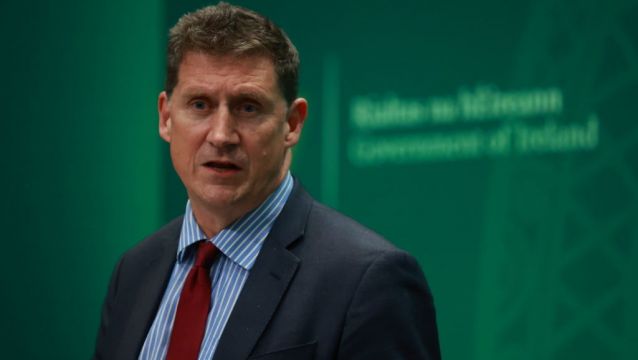Green Party leader and Minister for the Environment, Eamon Ryan, told the meeting that farmers were “not the enemy” and should not be targeted by environmental groups.
Mr Ryan was speaking at the Irish Creamery and Milk Suppliers Association (ICMSA) annual general meeting in Limerick.
One farmer from the floor said they were “not the villains in the climate change crisis”, to which Minister Ryan nodded in agreement and said he had never accused farmers of being the bad guys.
“If I or anyone else did, then I apologise,” said the minister.
“The only way we can do this is by consensus, and only if we listen to one another and work together. There should be no pointing or wagging of fingers at any one sector.”
However, Minster Ryan warned: “Climate change is real, and it is unfolding in a way that is truly terrifying, and we have to respond.”
Meanwhile, the president of the ICMSA, Pat McCormack accused the government of “enjoying hindering and obstructing farmers” producing milk, by supporting a cull of dairy cows to reduce carbon emissions.
He said this was happening while the Taoiseach was simultaneously supporting an increase in air traffic into Dublin Airport.
“And when they (the government) can’t be seen to be doing that themselves, they stand by cheerleading while others in their ‘pet’ NGOs do the dirty work for them.
“We’ve been told rising emissions are a global problem, and the survival of the human race, not to mind our family farms, depends on lowering emissions, so imagine our surprise then to be told that we can expect air travel to surge by 12 per cent next year.”
“We also had the DAA complaining that the current Dublin Airport passenger ceiling of 32 million was hopelessly inadequate – that was too low and it was going to cost Ireland money – and we had better get that up to 40 million pronto.”
“I’m no scientist, but surely increasing passenger numbers from 30-40million is going to involve more emissions; it’s going to mean massively increased emissions," he said.
Mr McCormack complained that dairy farmers faced increased hostility from environmental groups, and that a government-funded High Court action taken by An Taisce - which aims to overturn the state programme that regulates the level of nitrates that can be used as fertiliser - was part of a growing “animosity” towards farmers.
Accusations that dairy farms were the main offenders in the climate change crisis were, he said, “hot air”.
The Taoiseach’s support for lifting a ceiling on passenger numbers at Dublin Airport was “flawed logic” and “jaw-dropping double-standards”, compared to emission targets placed on farms.
While the DAA was concerned that keeping a passenger ceiling at Dublin Airport would result in new routes being lost to other competing hubs and airports, Mr McCormack added that farmers were similarly concerned that “the moment we drop the volumes of milk that we produce in the most sustainable way on the planet, milk production will immediately switch to other locations that are not as sustainable”.
“So, Ireland loses the money and the planet gets higher emissions”.
Mr McCormack said it appeared the government was arguing that “emissions don't matter for flights overseas for stag parties and hen nights, but do matter for food production in Tipp or Cavan or anywhere in Ireland”.
The government had also peddled a mantra that, “cows are bad - but stags and hen parties were no problem”, Mr McCormack said.
“How are the emissions involved in flying to Faro for a golf trip more acceptable and indeed to be encouraged than keeping a herd of cows in the fields around here in Clare?”
In response, the Taoiseach said he wanted “farmers to be part of the solution” and that while the current 25% reduction in emissions target was “significant” on the agriculture sector, farmers “can rise to the challenge”.
“The alternative is to be left behind, to loose control.”
The Taoiseach said the aviation industry was responsible for 2 per cent of all of Ireland’s carbon emission which was “not huge”.
He said the aviation industry was researching ways of producing “synthetic fuels” to replace existing solid fuels, said the Taoiseach.







